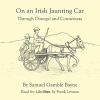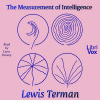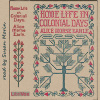Daniel Wallace Culp - Twentieth Century Negro Literature or A Cyclopedia of Thought on the Vital Topics Relating to the American Negro
Daniel Wallace Culp
100%
Speed
Readers
Length
32 hours 6 minutes
Year
1902
Summary
The object of this book is… (1) To enlighten the uninformed white people on the intellectual ability of the Negro. (2) To give to those, who are interested in the Negro race, a better idea of the extent to which he contributed to the promotion of America's civilization, and of the intellectual attainments made by him in the nineteenth century. (3) To reflect the views of the most scholarly and prominent Negroes of America on those topics, touching the Negro, that are now engaging the attention of the civilized world. (4) To point out, to the aspiring Negro youth, those men and women of their own race who, by their scholarship, by their integrity of character, and by their earnest efforts in the work of uplifting their own race, have made themselves illustrious; also, to enlighten such youth on those ethical, political, and sociological questions, touching the Negro that will sooner or later engage their attention. (5) To enlighten the Negroes on that perplexing problem, commonly called the «Race Problem,» that has necessarily grown out of their contact with their ex-masters and their descendants; and also to stimulate them to make greater efforts to ascend to that plane of civilization occupied by the other enlightened peoples of the world. (From the Preface) This book examines the following topics:
1. Did the American Negro make, in the nineteenth century, achievements along the lines of wealth, morality, education, etc., commensurate with his opportunities? If so, what achievements did he make?
2. Will it be possible for the Negro to attain, in this country, unto the American type of civilization?
3. How can the friendly relations now existing between the two races in the South be strengthened and maintained?
4. Should the Negro be given an education different from that given to the white?
5. Should the ignorant and non-property holding Negro be allowed to vote?
6. Is the criminal Negro justly dealt with in the courts of the South?
7. To what extent is the Negro pulpit uplifting the race?
8. Is it time for the Negro colleges in the South to be put into the hands of Negro teachers?
9. Will the education of the Negro solve the race problem?
10. What role is the educated Negro woman to play in the uplifting of her race?
11. How can the Negroes be induced to rally more to Negro business enterprises and to their professional men?
12. What are the causes of the great mortality among the Negroes in the cities of the South and how is that mortality to be lessened?
13. What should be the Negro's attitude in politics?
14. Is the Negro as morally depraved as he is reputed to be?
15. Is the young Negro an improvement morally on his father?
16. The Negro as a writer
17. Did the American Negro prove, in the nineteenth century, that he is intellectually equal to the white man?
18. What progress did the American white man make in the nineteenth century along the line of conceding to the Negro his religious, political and civil rights?
19. The Negro as a laborer
20. The Negro as a Christian
21. Does the North afford to the Negro better opportunities of making a living than the South?
22. What is the Negro teacher doing in the matter of uplifting his race?
23. Is the Negro newspaper an important factor in the elevation of the Negro?
24. Are other than Baptist and Methodist Churches adapted to the present Negro?
25. The Negro as a business man
26. The Negro as a farmer
27. The Negro as an inventor
28. What the omen?
29. Why the Negro race survives
30. The signs of a brighter future for the American Negro
31. Negro criminality
32. The American Negro's opportunities in Africa
33. The Negro and education
34. A Negro in it
35. The Negro's adversities help him
36. The American Negro and his possibilities
37. Important lessons from the awful tragedy
38. How to help the Negro to help himself
Authorization
By logging in, you agree to the terms and conditions.












No comments